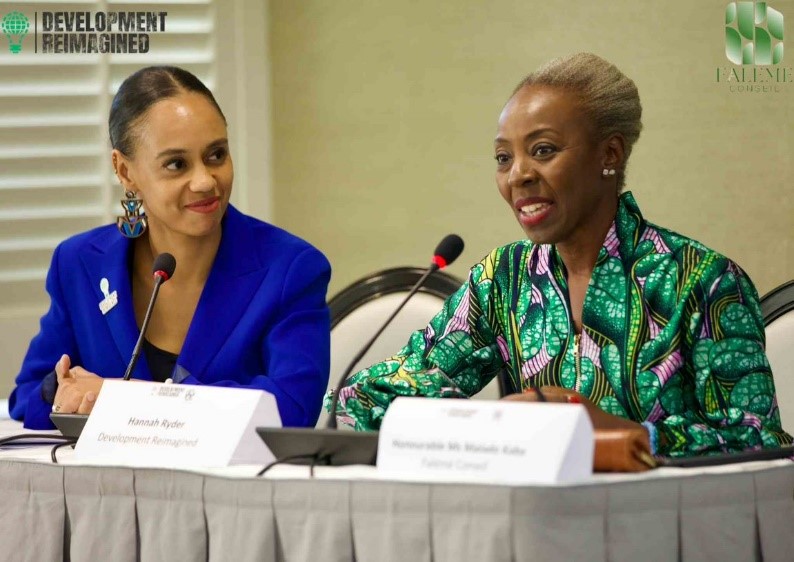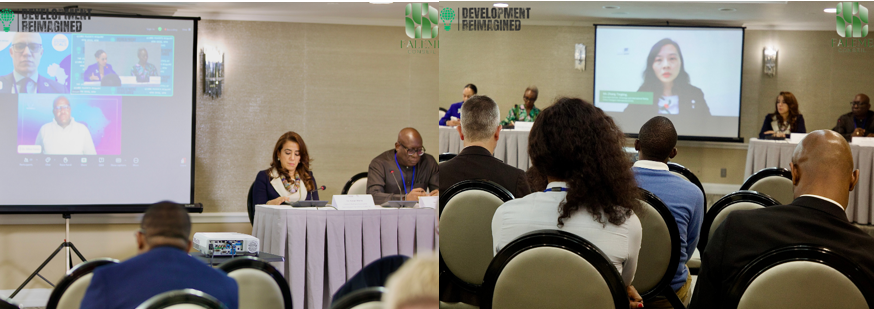Date Published: October 28, 2024.
24 October 2024: On the sidelines of the World Bank and IMF Annual Meetings, Development Reimagined and Falémé Conseil hosted a distinguished panel to explore the different methodologies of credit rating agencies (CRAs) and how these agencies can better align with Africa’s unique economic landscape.
Honourable Ms Malado Kaba, the Managing Director of Falémé Conseil and the Former Minister of Economy and Finance of the Republic of Guinea, provided a keynote speech where she emphasized that biased risk perception in Africa is the root of the risk premium imposed on African countries and costs nearly USD 24 billion in excess interest and more than USD 46 billion in forgone lending to the continent. Hon Ms Kaba also stressed the “two-treadmill challenge” whereby African governments are facing a constant balancing act between maintaining an adequate fiscal space while attempting to raise fresh capital for sustainable growth.

The event then moved into a panel discussion moderated by Ms Hannah Ryder, CEO of Development Reimagined, and an outstanding lineup of speakers, including Dr Hanan Morsy, the Deputy Executive Secretary and Chief Economist, United Nations Economic Commission for Africa (UNECA), Mr Paulo Gomes the Founder of Orango Investment Corporation, Co-Founder of New African Capital Partners and Chairman of PGP and Partners and former Executive Director at the World Bank, Ms Zhang Tingting the Executive Director, Sovereign and International Rating, China Chengxin International (CCXI), Dr Sifiso Falala, Founder and Chief Executive Officer, Sovereign Africa Ratings and Mr Isaac Babatunde the Executive Director of Agusto & Co. There were five key themes discussed:
- Need for accurate data and local presence. African countries need to strengthen their internal systems in gathering data and engaging with CRAs to ensure a fair assessment. Indeed, panellists stressed that the Big Three have never pretended to work in the interest of African countries but follow a strict methodology despite it being outdated. The assessments by these agencies are often completed by people who do not live or work on the continent and therefore have little to no context of the realities on the ground.
- Need for a regulatory body with international oversight. Panellists stressed the need for such a body with the power to monitor and adapt ratings found unfavourable by recipient countries. This would allow for more fair and accurate credit ratings for African countries at an international level.
- Learning lessons from local CRAs from around the world. Whilst the Big Three credit rating agencies currently control 90% of the market, there are several local CRAs around the world with better understandings of their local markets. For example, Ms Zhang Tingting stressed the differences in Chinese CRAs versus the Big Three in their methodologies in terms of what they deem significant.
- Utilize existing African CRAs. Local African CRAs have unique perspectives on rating methodologies. For example, August & Co adopts a more inclusive methodology by including 40% of qualitative data based on local knowledge, whilst working closely with the country or entity being assessed to better understand the local context so ratings are well informed. Other local CRAs, such as Sovereign Africa Ratings, have included the asset base of the continent and embraced a more quantitative methodology. Panellists also stressed that there is a need for more African CRAs that could potentially be accredited by the African Union to ensure overall quality and acceptance.
- Proactive engagement with investors. Investors often selectively interpret CRA ratings, discounting elements they deem irrelevant. Subsequently, African countries should actively engage with potential investors, understanding their priorities and the metrics that matter most to them. By doing so, African countries can better shape and communicate their narratives, ensuring their unique strengths and challenges are appropriately accounted for in global financial markets to reduce biased risk perceptions

Honourable Mr Jean-Paul Adam, the Director of Policy, Monitoring and Advocacy at the Office of the Special Adviser on Africa, United Nations Secretariat and former Minister of Finance, Trade and the Blue Economy of Seychelles provided a closing speech. Hon Mr Adam cited several pieces of data to dispute the African risk premium. For example, Moody’s has shown that the default rate of capital infrastructure projects in Africa was actually lower than in Europe, Latin America and Asia. He also reminded the audience that African countries need to invest in themselves extensively, to prove to the rest of the world that investing in Africa is not only safe but highly beneficial and profitable.
Watch the full event below.


